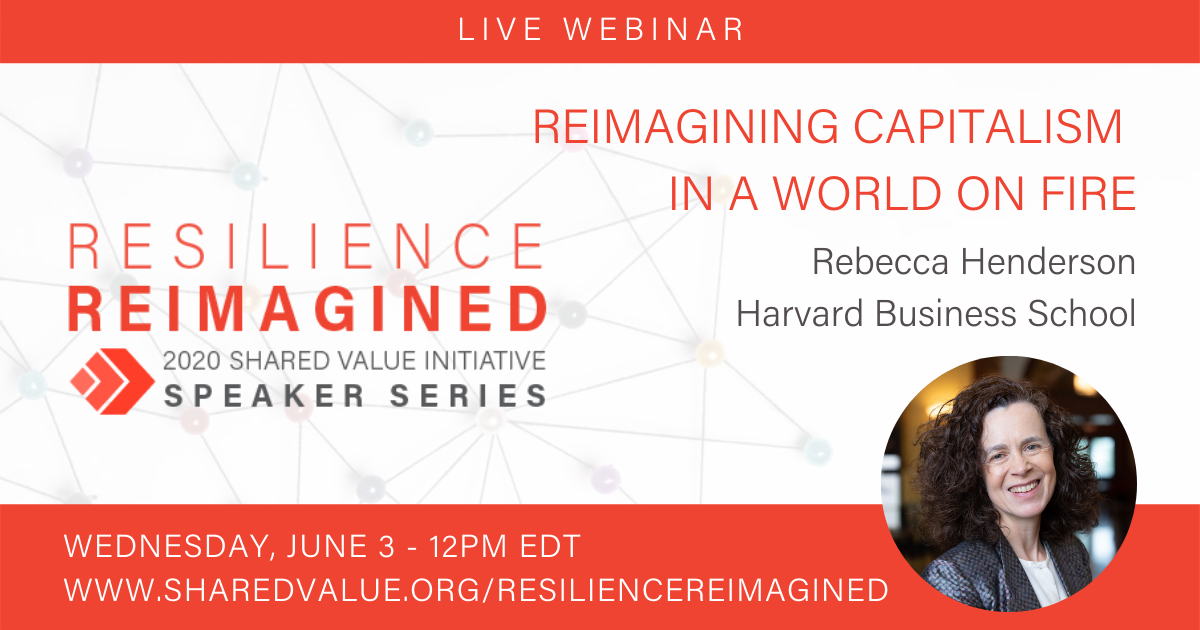Resilience Reimagined: A Q&A with Rebecca Henderson

Resilience Reimagined: A Q&A with Rebecca Henderson
In the lead up to our conversation with Rebecca Henderson of Harvard Business School as part of our Resilience Reimagined Speaker Series, we sat down with her to discuss the impetus of her book, Reimagining Capitalism in a World on Fire, and how she’s thinking about the current COVID-19 crisis.
1. What was the catalyst that led you to write, Reimagining Capitalism in a World on Fire? What sets it apart from previous books critiquing capitalism?
My MBA students insisted! And they insisted for the reason that makes this book unique – they said that the world needed a pragmatic road map to how business might actually be able to drive the kinds of systemic changes we need to reimagine capitalism.
2. With COVID-19 exacerbating the inequities and structural problems of our current systems, do you think it will accelerate the move to reimagine capitalism? If so, who do you think will be the first movers on this front? Companies? Investors? Governments?
It might. We will come out of the pandemic poorer – and possibly angrier and more afraid than we went in. But the pandemic has made the costs of continuing to ignore rampant inequality much more visible – and highlighted the ways in which we are all truly interdependent. The fact that you can’t afford not to work, despite the fact that you’re sick, increases the odds that I will suffer as well. The pandemic has also highlighted the many ways in which a strong economy – and a vibrant capitalism – depend on the existence of capable, well run government. So the appetite for change is there.
I think investors will move first – indeed there’s every sign that they are already moving — because COVID-19 has made the idea that public goods problems like climate change, inequality and public health are plausibly the greatest threat to their long term returns very real. But companies will move as well. I’ve heard many business people claim that one of the things they have learned from the pandemic is that while they might have managed their supply chains to maximize efficiency and to reduce costs, going forward they are going to think a lot more about managing for risk. And it’s clear we need to reimagine capitalism if we’re going to reduce the huge systemic risks we face.
3. What role do you see Shared Value playing in reimagining capitalism?
Shared Value is absolutely fundamental. We won’t reimagine capitalism unless we find a way to reimagine the purpose of the firm – whilst making sure that investors still see decent returns. Seeking shared value is critical to this effort since it demonstrates – very tangibly – just what it means to focus simultaneously on the bottom line whilst solving social and environmental problems. It’s also critical because it’s a powerful driver of the waves of innovation we’re going to need if we’re to make progress. Shared value driven firms have the power to act as catalysts – transforming entire industries by demonstrating that change is possible. They are also often pioneers in recognizing the need for collective action to address problems facing the industry – driving change through making doing the right thing pre-competitive. Last but not least, they are more likely to support the kind of sensible public policy that makes doing the right thing the only choice.
4. You’ve frequently said that you’re hopeful but not optimistic that society can make the necessary changes to prevent further destruction of our planet and society. What do you mean by this?
If I were optimistic I’d be reasonably certain that we were going to reimagine capitalism sooner rather than later. But I’m nowhere near certain. I think it’s possible that we will continue down our current track, trusting that sooner or later things will work out. But if we do nothing, nothing will change – we will leave climate change unaddressed, and do nothing substantive to make sure that everyone has a chance to participate in economic growth. Our politics will become even angrier and more divisive. But I am hopeful. I am sure there is another path. We have the technology and the resources to build a sustainable, equitable society. If we can decide to do things differently – to rebalance our society in ways that hold the tension between “me” and “now” with the importance of “us” and “later” – we can make all the difference in the world.
To hear more from Professor Henderson we encourage you to register and attend our conversation with her on Wednesday, June 3. Please register here.

